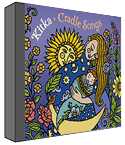 |
 |
 |
 |
 |
 |
 |
 |
 |
 |
 |
 |
 |
 |
 |
|
|
To listen to audio on Rock Paper Scissors you'll need to Get the Flash Player
|
 |
| log in to access downloads |
Sample Track 1:
"Cradle Song (Russian Jewish)" from Cradle Songs
|
Sample Track 2:
"Megruli Nana (Georgian)" from Cradle Songs
|
Sample Track 3:
"Haidi Nani (Romanian) " from Cradle Songs
|
Sample Track 4:
"Nanourisma (Greek, Southern Albanian)" from Cradle Songs
|
Sample Track 5:
"Butterfly Songs (Bulgarian, American)" from Cradle Songs
|
Sample Track 6:
"Three Armenian Lullabies (Armenian)" from Cradle Songs
|
Sample Track 7:
"Dzurk, Dzurk (Komi-Zyrian)" from Cradle Songs
|
Sample Track 8:
"Bedtime Story (Russian, Ukrainian)" from Cradle Songs
|
Sample Track 9:
"Kakhuri Nana (Georgian)" from Cradle Songs
|
Sample Track 10:
"Slow to the Dawn (American)" from Cradle Songs
|
Sample Track 11:
"Sun Sunuvah, Sun Bulnuvah (Bulgarian)" from Cradle Songs
|
Sample Track 12:
"Këngë Djepi (Albanian)" from Cradle Songs
|
Sample Track 13:
"Es Ak'vani (Georgian)" from Cradle Songs
|
Sample Track 14:
"Oj Jano, Jano (Macedonian)" from Cradle Songs
|
Sample Track 15:
"Lale Li Si, Zjumbjul Li Si, Gjul Li Si (Bulgarian)" from Cradle Songs
|
Sample Track 16:
"Aylye, Lyulye, Lyulye (Yiddish)" from Cradle Songs
|
Sample Track 17:
"Sednala e Majka Kraj More (Bulgarian)" from Cradle Songs
|
Sample Track 18:
"Nani, Nani, Kitka Mou (International)" from Cradle Songs
|
|
|
 |
CD Review
|
| Click Here to go back. |
Sound roots, CD Review >>
I'm in the car, driving west into -- I kid you not -- the sunset. Above me a sky with breathtaking swooshes of scarlet and orange, on the stereo otherworldly vocal harmonies that seem to transport me to another time and place. I pull over to watch and listen. Perhaps somewhere in rural Russia a mother is humming this same song to a child, for while the tune opens the new album by Oakland based Kitka, it originated with Jews in the old country. Hauntingly beautiful women's polyphonies are the hallmark of Kitka, which has been together since 1979, and their voices are perfectly suited to the 18 Eastern European lullabies on Cradle Songs. Almost entirely a cappella, the songs range originate in various cultures including Bulgaria, Albania, Georgia, Russia, and Armenia, and often sound deeper, sadder, or more nostalgic than one might expect from songs for children.
 "The Armenian lullaby texts have stunningly beautiful poetry, with a lot of powerful, natural and cosmic imagery. But there are also lyrics that convey intense sadness and longing," Kitka singer Shira Cion explains. "The songs tell histories of children and parents lost, of cultural genocide. In many Eastern European lullabies, the mother pours out all the grief, fears, and hopes in her soul when she sings to her child. Our close friend and mentor in Ukrainian folk song, Mariana Sadovska, even jokingly refers to some of the cradle songs from her native tradition as "sadistic lullabies.' " "The Armenian lullaby texts have stunningly beautiful poetry, with a lot of powerful, natural and cosmic imagery. But there are also lyrics that convey intense sadness and longing," Kitka singer Shira Cion explains. "The songs tell histories of children and parents lost, of cultural genocide. In many Eastern European lullabies, the mother pours out all the grief, fears, and hopes in her soul when she sings to her child. Our close friend and mentor in Ukrainian folk song, Mariana Sadovska, even jokingly refers to some of the cradle songs from her native tradition as "sadistic lullabies.' "
"At first, I found these lullabies really challenging," reflects Kitka singer Janet Kutulas, whose Greek family sang her one of the songs the group wove into "Nani, Nani, Kitka Mou." "They seemed almost inaccessibly dark. But the more you listen to them, the more and more beautiful they become. They aren’t your stereotypical tra-la-la lullaby."
This song is from the Russian republic of Komi, west of the Ural Mountains. Sung in the Komi-Zyrian language, the lyrics tell of the creaking of the birch pole that holds the cradle as grandmother sings her grandson to sleep. 11/05/09 >> go there
|
| Click Here to go back. |
|
 |
|
|
|